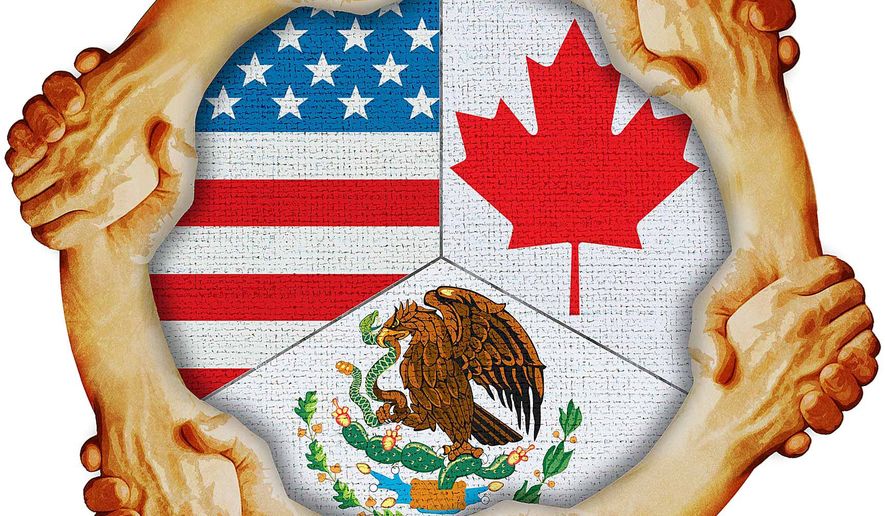OPINION:
Newly-elected House Democrats are urging Nancy Pelosi to focus on the nation’s tough problems — like infrastructure and health care — not compulsively opposing President Trump. Enacting the U.S.-Mexico-Canada Free Trade Agreement would be an excellent place to start.
NAFTA was renegotiated for good reasons and bad. It was implemented before the digital revolution, breakthroughs in DNA and biologicals and challenges posed by Chinese mercantilism and the meltdown of the European Union.
However, complaints from socialists among Democrats and the xenophobic wing of the GOP that the original agreement was a bad deal for American workers are patently false.
Detractors point to the $75 bilateral trade deficit with Mexico. Mr. Trump likes to cite a deficit with Canada that does not exist — we have a deficit on goods but once services are added, we have a modest surplus with our northern neighbor.
The facts are that Mexico City used NAFTA to become a springboard for global free trade. It has negotiated deals with the EU, Japan and more other countries than any government on the planet. U.S. automakers and other manufacturers — as well as many service providers — can set up shop in Mexico and take advantage of duty-free or preferred access to those markets — that’s something they can’t do from the United States.
That giant sucking sound that Ross Perot talked about was not merely cheap labor — though that surely helped. Rather, Mexicans executed a smarter trade policy than the Americans, who have become decidedly adept at blaming others, whether justified or otherwise, for job losses and mounting foreign debt to finance imports to live beyond their means. Whatever your thinking or visceral instincts about President Trump and Peter Navarro’s ruminations on trade, America’s chief negotiator, Robert Lighthizer should get his head chiseled on the Mount Rushmore of American trade lawyers and economists for the masterful job he has done piecing together the USMCA.
The accomplishments may be thrown into two baskets.
Some are unalloyed benefits for those who like open markets and free competition. For example, Mr. Lighthizer won better access in Canada for U.S. dairy, poultry and eggs — make or break goals for U.S. farmers. The agreement contains stronger protections for intellectual property and much freer access for U.S.-based technology services, and safeguards against the protectionist impulses of legislators and bureaucrats to undercut those, for example, by prohibiting government regulations that cloud and data services be domiciled in any one of three countries.
Recognizing the threat that China poses with its subsidized steel and aluminum and rising and state-promoted car industry, it raises from 62.5 to 75 percent the North American content required in autos to qualify for duty free treatment and that the metals in cars be largely of North American origin. And it includes some tougher content requirements — what we call in the trade wonk world “rules of origin”— in textiles, chemicals, glass and optical fiber.
It also requires that 40 to 45 percent of the labor in motor vehicles be paid at least $16 an hour. This mostly applies to Mexico as the United Autoworkers and their Canadian brethren get a lot more than that in wages and benefits.
Free trade purists see such provisions as protectionist but trade agreements are not negotiated on Ivy League blackboards, where workers magically move from production jobs in auto parts plants in Michigan to coding jobs in Long Island City when Chinese or Korean imports, benefiting from a state subsidy or cheap currency, knock off their jobs.
It’s hardly free trade for a Taiwanese bicycle manufacturer to source parts in China and set up screwdriver operation in Mexico to attach a few wheels and then send the product north to evade U.S. tariffs.
Without handicapping the deal with complexity only benefiting trade lawyers and bureaucrats and to combat China playing one USMCA partner against another, the agreement imposes on Mexico and Canada a tough choice — free trade with China or America.
If either ink a deal with the Middle Kingdom, they are out of agreement and the USMCA becomes a bilateral deal between the remaining two partners.
Like sausages and laws — free trade deals are made in the real world with folks for an appetite for progress. The possible is never perfect, and House Democrats should put aside their partisan instincts to help pass it.
• Peter Morici is an economist and business professor at the University of Maryland, and a national columnist.




Please read our comment policy before commenting.